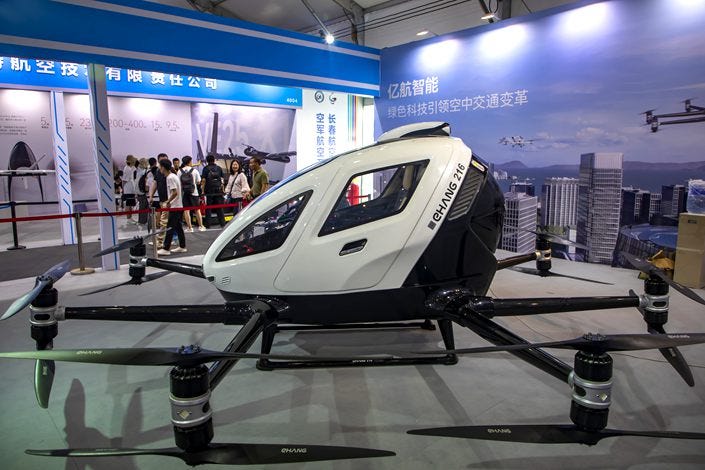Tech Insider: Toughened U.S. Chip Export Curbs, Flying-Car Maker EHang’s Local Government Deal
Chinese AI startup raises $300 million from Alibaba and Tencent, Changan Auto plans to build Thai NEV plant, and Baidu claims its Ernie chatbot is as good as ChatGPT
Photo: VCG
Four things to know about toughened U.S. controls on chip sales to China
The U.S. on Tuesday announced an updated set of export controls over more advanced artificial intelligence (AI) semiconductor and chipmaking equipment, aiming to close loopholes in existing rules and further block China’s access to American technology.
The controls focus on three main areas: adjusting the parameters that identify a restricted chip, expanding the list of controlled semiconductor manufacturing equipment, and adding more Chinese firms to the “entity list,” the U.S blacklist of restricted organizations, according to a press release by the U.S. Commerce Department’s Bureau of Industry and Security (BIS).
The BIS said that the updated rules are intended to maintain the effectiveness of the controls and prevent workaround efforts based on loopholes in the rules introduced last October.
EHang forges partnership with Hefei to commercialize its self-flying cars
Flying-car maker EHang Holdings Ltd. said on Wednesday that it has established a $100 million partnership with the government of Hefei, Anhui province, to bring its self-driving air taxis into commercial use.
Under the partnership, EHang will take part in Hefei’s development of a low-altitude economy ecosystem and launch regular operations with its unmanned aerial vehicles in a park in the provincial capital city, the company said.
A low-altitude economy is an economy supported by the transportation, logistics and tourism industries using drones or flying cars as well as the production of the vehicles.
The Hefei municipal government agreed to provide EHang various forms of support including coordinating or facilitating orders of at least 100 of its EH216 series unmanned aerial vehicles, and offering support for land use, infrastructure construction and subsidies, according to EHang.
EHang said last week that its two-passenger air-taxi EH216-S secured a type certificate from the Civil Aviation Administration of China, a classification that signifies airworthiness.
Chinese AI startup raises $300 million from Alibaba, Tencent
Alibaba Group Holding Ltd. and Tencent Holdings Ltd. have joined a $300 million financing round for Baichuan, one of scores of Chinese generative AI startups hoping to capitalize on a surge of interest in ChatGPT-like services.
Smartphone maker Xiaomi Corp. also participated in the early funding round for Baichuan, which was only founded in April by the founder of search engine Sogou yet is already a unicorn valued at more than $1 billion.
Baichuan was among the first batch of Chinese firms to win Beijing’s approval for a public rollout of its service. It has since released four open-source large language models and is working on two proprietary platforms, the company said in a statement.
Baidu claims its Ernie chatbot is now as good as ChatGPT
Baidu Inc.’s founder Robin Li declared his company’s large language model has finally caught up with OpenAI’s advanced GPT-4, claiming the lead in his country’s race to develop AI that can rival the U.S.
The billionaire took the stage in Beijing on Tuesday to run Ernie 4.0 through a Q&A designed to showcase its ability to provide answers and solve complicated puzzles on the fly. Ernie Bot has matched OpenAI’s seminal product in terms of sophistication and general capabilities, Li said.
The chatbot has surpassed 45 million users — a milestone that still lags ChatGPT’s estimated 180 million, though the U.S. bot launched months earlier. The Chinese search leader is pinning its hopes on AI to help surpass rivals from Alibaba to Tencent.
Changan Auto to build NEV plant in Thailand
Chinese state-owned carmaker Chongqing Changan Automobile Co. Ltd. signed an agreement on Tuesday to invest 8.8 billion Thai Baht ($242 million) in a new-energy vehicle (NEV) factory in Thailand.
The first phase of the project is expected to have an annual production capacity of as many as 100,000 electric and hybrid vehicles, Changan said on Wednesday. The cars will be sold locally and exported to markets in Southeast Asia, Australia, New Zealand, the U.K. and South Africa, the company said.
The Thai plant is part of Changan’s plan announced in April to invest $10 billion overseas to establish an annual production capacity of 1.2 million vehicles outside of China by 2030.




